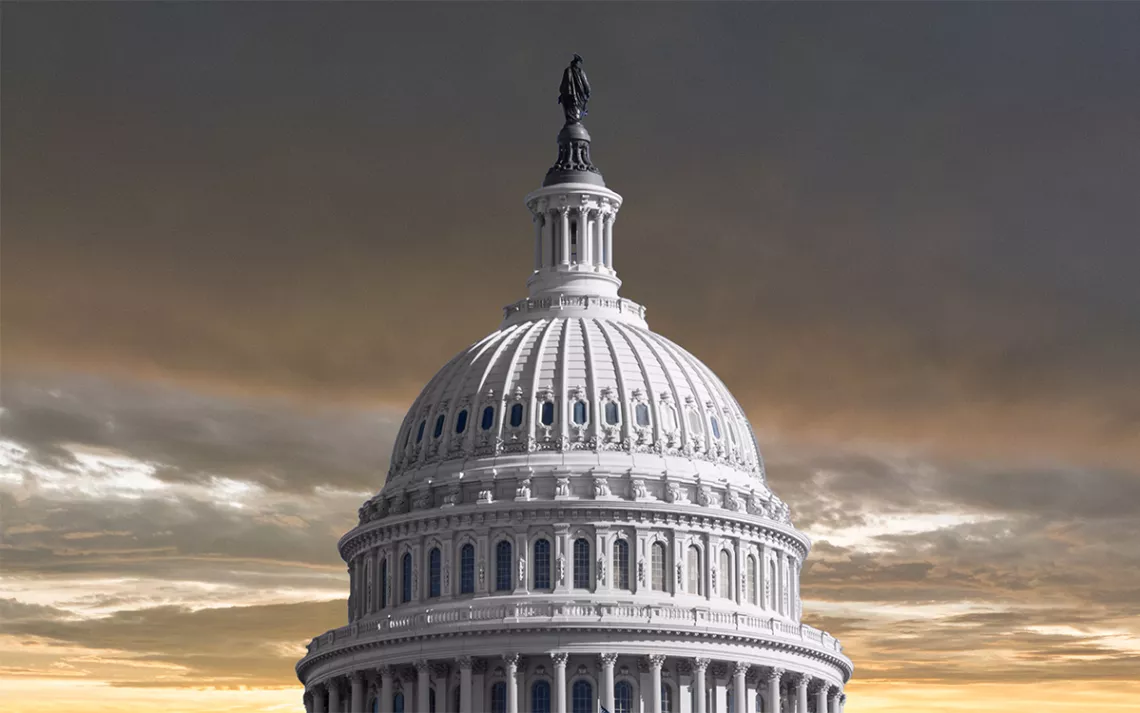The Democratic Party Has a Climate Change Problem
The Democratic Party appears to be moving backward on climate action

Photo by trekandshoot/iStock
In late May—days after President Donald Trump announced that the United States would withdraw from the Iran nuclear deal—Senate Minority Leader Charles Schumer stood in front of a gas pump at a D.C. Exxon and lambasted the president for his role in raising gas prices for Americans across the country.
If that image—a Democratic leader griping about the unavailability of cheap fossil fuel for internal combustion engines—seems out of touch with the image of a party that has positioned itself to be the leading voice on climate action, you haven’t been paying attention to the way that the Democratic Party, as an institution, deals with climate change.
That is not to say that Democrats and Republicans are equal in their approach to climate change. Nor is it to say there aren’t elected Democrats who have become important champions for climate action. For almost two decades, Democrats have had a near monopoly on the political conversation around climate change. Registered Democratic voters are the most likely among any political party—Democratic, Republican, or independent—to care about climate change. Democratic lawmakers tend to accept the scientific consensus on climate change at a much higher rate than their Republican counterparts. In Congress, Democratic lawmakers consistently rank higher in their environmental voting records than do Republicans.
But as an institution, the Democratic Party has yet to figure out how to grapple with climate change. Almost two years after the election of Donald Trump—and less than 100 days from a midterm election that could redefine the balance of power in the House of Representatives and perhaps the Senate too—the Democratic Party has yet to craft a unified message of climate action. Instead, the party as a national establishment seems to be moving backward, toward a policy that embraces a staid status quo rather than the kind of forward-thinking necessary to stop the climate crisis.
Take the party’s recent bit of backtracking on a resolution to prohibit fossil fuel companies from contributing to political campaigns. A little over a week ago, the Democratic National Committee reversed its position on a previously adopted resolution that prohibited donations from fossil-fuel-aligned corporate PACs. According to DNC chairman Tom Perez, the reversal was done out of support for fossil fuel workers and labor interests—specifically as an olive branch to union members who have fled from the party in recent years. But just over 4 percent of mining workers are unionized; more likely, the reversal is an overture to fossil fuel executives who would have seen their influence dwindle under the original resolution.
Or take the fact that the official Democratic rebuttal to Trump’s State of the Union Address this year omitted any mention of climate change, despite delivering the rebuttal against the backdrop of an administration that is interested in nothing less than the systematic dismantling of domestic and international climate policies.
It’s easy to dismiss the Democratic Party’s anodyne response to the climate crisis as a reflection of the priorities of the institution, which is, broadly, to elect more Democratic politicians to political office. After all, with the Trump administration likely to veto any climate legislation that would come from Congress, Democrats often make the calculus that it’s easier to focus on criticizing Republican climate denial than to spend time on sweeping proposals that have little chance of becoming law.
But for the one national party that could actually do something about the climate crisis, that’s exactly the wrong position to take—especially at this moment in history. See, for example, how climate change impacts are becoming increasingly clear to everyone, not just those on the left. According to a 2017 Gallup poll, U.S. concern about climate change is at a three-decade high. Renewable energy, for the most part, has become a bipartisan issue. According to a 2018 Pew poll, a majority of both Democrats and Republicans support expanding wind and solar projects, and more respondents in both parties supported expanding renewable projects over fossil fuel projects.
As an electoral issue, the voters most likely to view climate change as a pressing problem in need of a political solution are exactly the kinds of voters that Democrats need to turn out in competitive midterm elections, particularly young people and people of color. Among Democrats writ large, climate change is the sixth most important issue ahead of the 2018 midterm elections. But turning out those voters requires offering them a platform that inspires. It’s not enough to simply be against the destructive policies of the Trump administration and Republican politicians. To galvanize voters around climate action, the party needs to offer a bold path forward.
Thus far, the Democratic Party has mostly failed to embrace climate change as a social justice or economic equity issue. Instead of tying the transition to a clean energy economy to other popular proposals like a federal jobs guarantee or a nationwide investment in infrastructure and attendant job creation, the party has clung to the status quo of an all-of-the-above energy platform and a conception of climate action that seems to begin and end with market-based solutions like a carbon tax.
That could change in 2018, with young Democrats like Alexandria Ocasio-Cortez bringing progressive climate policies like a Green New Deal into the national conversation on climate action. Or that could change in 2020, as climate-fueled natural disasters continue to become more destructive and dangerous.
The truth is that with the Republican Party still functioning as one of the only major national parties in the world to deny the scientific consensus on climate change, the Democratic Party has largely won the climate battle by default. But that’s not good enough anymore—for the climate, for the country, and for the party. It’s time for the Democratic establishment to recognize that fact before the cost of climate change—on the planet and on communities—climbs even higher.
 The Magazine of The Sierra Club
The Magazine of The Sierra Club



